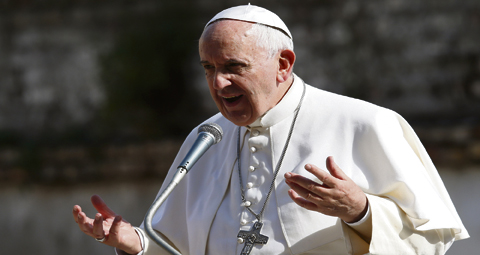May 29 | ![]() 0 COMMENTS
0 COMMENTS ![]() print
print

Pope Francis calls on international community to help fix migrant crisis
Holy Father called on the international community on Sunday to help migrants crossing the Bay of Bengal and the Andaman Sea, thousands of whom have been stranded on boats with dwindling supplies.
“I continue to follow with profound worry and pain in my heart the stories of many refugees in the Bay of Bengal and the Andaman Sea,” the Pope said to crowds who had gathered for his Regina Coeli address in St Peter’s Square last Sunday.
A migrant crisis has flared up in Southeast Asia as Rohingya Muslims fleeing persecution in Myanmar and Bangladeshis trying to escape poverty at home become prey to human traffickers.
After Thailand cracked down on the practice, traffickers began abandoning overloaded boats on the open sea rather than trying to smuggle the people through Thailand. The United Nations refugee agency said on Friday some 3500 are stranded.
The Holy Father said that he appreciated the efforts of countries that have agreed to take in people who are facing ‘severe suffering and danger,’ but encouraged ‘the international community to offer them humanitarian assistance.’
Indonesia has begun search and rescue missions for the thousands of migrants believed to be adrift in its waters. The country had initially been fending off boats, but has since agreed to provide them with temporary shelter.
Over 3000 people—mostly Bangladeshi or Rohingya Muslims from Myanmar—have arrived in Indonesia, Malaysia and Thailand in the past two weeks.
The UN Secretary-General, Ban Ki-moon, has called on South-East Asian nations to do more to protect migrants.
“It’s important to save human lives. Whatever the reasons may be when they are out on the sea, their life is endangered,” Mr Ban said in a speech in Vietnam.
The scale of the problem facing migrants in the region was revealed on Monday when Malaysian police said 139 suspected migrant grave sites have been found in 28 people-trafficking camps along the Thai border.
National Police Chief Khalid Abu Bakar said some of the graves—found since May 11—may contain more than one body. They are close to an area of Thailand where trafficking camps and dozens of shallow graves were found this month.
Thailand subsequently cracked down on the routes used by traffickers to move migrants through its territory. The operation forced traffickers to move the migrants by sea instead. Thousands were left stranded, however, after the traffickers abandoned them and no country would take them in.
The traffickers have been using the jungles of southern Thailand and northern Malaysia for years to smuggle people into Malaysia. Most of the migrants are Rohingya Muslims fleeing persecution in Myanmar, rights groups say, but others are Bangladeshis seeking employment in Malaysia.











